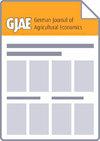农业环境氮污染减少政策设计初始假设的含义:来自克罗地亚的准经验证据
IF 1.5
4区 经济学
Q4 AGRICULTURAL ECONOMICS & POLICY
引用次数: 0
摘要
本文旨在扩大对多功能农业中氮污染减排政策潜在一般平衡效应的理解。根据欧盟硝酸盐指令,为了减少农业氮污染,一个国家可以在市场和命令控制措施之间选择(或结合)。为了处理来自农业来源的硝酸盐污染,克罗地亚采用诸如投入法规和管理实践等措施,而不是基于市场的措施。本文在克罗地亚基于CGE模型的数据中评估了选择市场和命令控制为基础的农业氮肥减少政策的福利和宏观经济效应。本文强调了通常的理论假设,即劳动力市场清洁假设和农业生产中氮的可替代性程度对政策处方的重要性。即,研究结果表明,农业环境政策处方在很大程度上取决于劳动力市场清洁假设和农业生产中氮的可替代性。本文还强调了目前CGE模型在农业环境氮减排相关政策评价中的局限性,并强调了未来研究的方法和数据库开发需求。本文章由计算机程序翻译,如有差异,请以英文原文为准。
Implications of Initial Assumptions in Agri-Environmental Nitrogen Pollution Reduction Policy Design: Quasi-Empirical Evidence from Croatia
This paper aims to extend understanding of potential general equilibrium effects of nitrogen pollution reduction policies in multifunctional agriculture. Under the EU Nitrates Directive, to achieve agricultural nitrogen pollution reduction, a country can choose between (or combine) market and command-and-control measures. To deal with nitrate pollution from agricultural sources Croatia uses measures such as input regulations and management practices, rather than market-based measures. This paper evaluates welfare and macroeconomic effects of selected market and command-and-control based agricultural nitrogen reduction policies within Croatian data based CGE model. The paper highlights the importance of usual theoretical assumptions, i.e. labor market cleaning assumption and the degree of substitutability of nitrogen in agricultural production, for policy prescriptions. Namely, the results suggest that agri-environmental policy prescriptions largely depend upon labor market cleaning assumption and substitutability of nitrogen in agricultural production. The paper also emphasizes current limitations of CGE models for agri-environmental nitrogen reduction related policies evaluation and highlights the methodological and database development needs for future research.
求助全文
通过发布文献求助,成功后即可免费获取论文全文。
去求助
来源期刊

German Journal of Agricultural Economics
AGRICULTURAL ECONOMICS & POLICY-
CiteScore
1.60
自引率
20.00%
发文量
0
期刊介绍:
The GJAE publishes a broad range of theoretical, applied and policy-related articles. It aims for a balanced coverage of economic issues within agricultural and food production, demand and trade, rural development, and sustainable and efficient resource use as well as specific German or European issues. The GJAE also welcomes review articles.
 求助内容:
求助内容: 应助结果提醒方式:
应助结果提醒方式:


